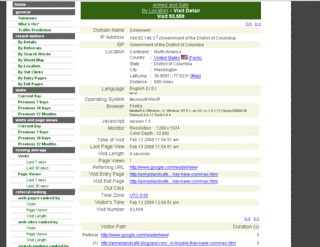Reading this article about Senator Kay Bailey Hutchison (R-TX) and the amicus brief filed by her, fifty-four other senators, 250 representatives, and Vice President Cheney, I was struck by a rather odd statement made by acting D.C. Attorney General Peter Nickles.
"The court will decide, based on the language and the commas and the preamble and the words, what the framers meant in the Second Amendment. Whether there was an absolute right to own firearms or whether the framers only intended for that right to be exercised in the context of a militia," he said.Excuse me, Pete, but did you say that commas will have a bearing on this issue? That questions related to a fundamental human right are to be decided on the basis of punctuation?
The natural first reaction would be, of course, to wonder if Nickles has been smoking something that a person in his position oughtn't be smoking. As the New York Times points out, though, he isn't the first to try to make an issue of the commas in the Second Amendment.
The outcome of the case is difficult to handicap, mainly because so little is known about the justices’ views on the lethal device at the center of the controversy: the comma.Actually, it seems that the "comma controversy" dates back at least as far as the amicus brief prepared by David Yassky in the United States v. Emerson case in 2001. In it, Yassky attempts, in bizarrely convoluted fashion, to argue that the commas mean that "shall not be infringed" applies to a right not "of the people," but of the "well regulated militia."
The first unusual comma --between "Militia" and "being" -- forces the reader to search for a verb for which "Militia" is the subject. That verb does not appear until "shall not be infringed" near the end of the Amendment. The second unusual comma -- between "Arms" and "shall" -- sets off the verb phrase "shall not be infringed" from the preceding language; it suggests that the subject for this verb phrase is not simply "the right of the people to keep and bear Arms." The grammatical effect of these two unusual commas is to link "A well regulated Militia" to "shall not be infringed" to emphasize, in other words, that the goal of the Amendment is to protect the militia against federal interference. The Constitution was drafted with great care, and (unlike much legal writing from the Founding period) its use of punctuation generally conforms to modern conventions, suggesting that the commas in the Second Amendment are not haphazard but rather deserve scrupulous attention.Going back to the New York Times Op-Ed linked to above, we see how silly this "controversy" is.
Refreshing though it is to see punctuation at the center of a national debate, there could scarcely be a worse place to search for the framers’ original intent than their use of commas. In the 18th century, punctuation marks were as common as medicinal leeches and just about as scientific. Commas and other marks evolved from a variety of symbols meant to denote pauses in speaking. For centuries, punctuation was as chaotic as individual speech patterns.In the end, I have some punctuation of my own. Molon Labe--excla-frickin'-mation point.
The situation was even worse in the law, where a long English tradition held that punctuation marks were not actually part of statutes (and, therefore, courts could not consider punctuation when interpreting them). Not surprisingly, lawmakers took a devil-may-care approach to punctuation. Often, the whole business of punctuation was left to the discretion of scriveners, who liked to show their chops by inserting as many varied marks as possible.
Another problem with trying to find meaning in the Second Amendment’s commas is that nobody is certain how many commas it is supposed to have. The version that ended up in the National Archives has three, but that may be a fluke. Legal historians note that some states ratified a two-comma version. At least one recent law journal article refers to a four-comma version.
Hey, look--a visitor:


 Stumble it!
Stumble it!





1 comments:
makes no difference, since the people ARE the militia. What's the worse they do? Say every gun owner is a criminal and come for us? HA! We're already livin' in a low security federal prison, nationwide...cops and armed guards everywhere, security cameras, gang fights in the street. It can only get better if the prisoners take over the prison.
,,,,,,,,,,,,,,,,,,,,,,,,,,,,,,
,,,,,,,,,,,,,,,,,,,,,,,,,,,,,,
,,,,,,,,,,,,,,,,,,,,,,,,,,,,,,
Sorry, just loading up my hi-capacity comma clip magazines.
Post a Comment